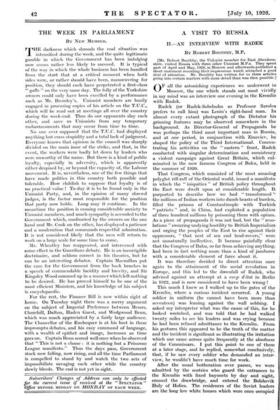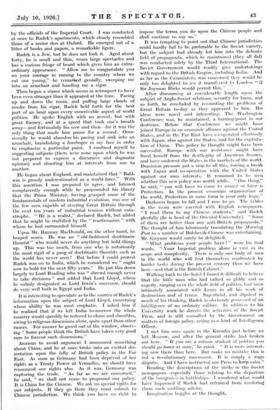[Mr. Robert 13oothby, the Unionist member for East Aberdeen. shire,
visited Russia with three other Unionist M.P.s. They spent part of April and May, 1926, in Moscow and afterwards published a short statement recording their impressions which attracted a good deal of attention. Mr. Boothby has written for us three articles going into certain matters with more detail than was then possible.] OF all the astonishing experiences we underwent in Moscow, the one which stands out most vividly in my mind was an interyiew one evening in the Kremlin with Radek.
Radek (or Radek-Sobelsohn as Professor Sarolea prefers to call him) was Lenin's right-hand man. In almost every extant photograph of the Dictator his grinning features may be observed somewhere in the background. As Director-General of Propaganda he was perhaps the third most important man in Russia, and at one period, in conjunction with Zinoviev, he shaped the policy of the Third International. Concen- trating his activities on the " eastern " front, Radek conducted with singular determination and consistency a violent campaign against Great Britain, which cul- minated in the now famous Congress of Baku, held in the summer of 1920.
That Congress, which consisted of the most amazing polyglot riff-raff of the Oriental world, issued a manifesto in which the " iniquities " of British policy throughout the East were dwelt upon at considerable length. It purported to describe how we had " transformed " the millions of Indian workers into dumb beasts of burden, filled the prisons of Constantinople with Turkish " patriots " and, in China, had exploited a population of three hundred millions by poisoning them with opium. As a piece of propaganda it was not bad, but the "reso- lutions "swearing undying hostility to British Imperialism and urging the peoples of the East to rise against their oppressors, "that nest of sea and land-rovers," were not unnaturally ineffective. It became painfully clear that the Congress of Baku, so far from achieving anything, had been in fact nothing more than a kind of jamboree with a considerable element of farce about it.
It was therefore decided to direct attention once again to the attainment of the social revolution in Europe, and this led to the downfall of Radek, who advised against an attempt at a coup d'etat in Berlin in 1922, and is now considered to have been wrong !
This much I knew as I walked up to the gates of the Kremlin, where a curious incident occurred. A young soldier in uniform (he cannot have been more than seventeen) was leaning against the wall sobbing. I asked my interpreter what was the cause of this, for he looked wretched, and was told that he had wslked twenty miles to see his leaders and was crying because he had been refused admittance to the Kremlin. From his gestures this appeared to be the truth of the matter and the incident is significant as illustrating the irritation which one came across quite frequently at the aloofness of the Commissars. I put this point to one of them at a later stage, and he replied, somewhat conclusively, that, if he saw every soldier who demanded an inter- view, he wouldn't have much time for work.
After the usual botheration over passes, we were admitted by the sentries who guard the entrances to the Kremlin with fixed bayonets by day and night, crossed the drawbridge, and entered the Bolshevik Holy of Holies. The residences of the Soviet leaders are the long low white houses which were once occupied by the officials of the Imperial Court. I was conducted at once to Radek's apartments, which closely resembled those of a senior don at Oxford. He emerged out of a litter of books and papers, a remarkable figure.
Radek is a Jew, but he does not look it. Aged about forty, he is small and thin, wears large spectacles and has a curious fringe of beard which gives him an extra- ordinary appearance. "Allow me to congratulate you on your courage in coming to the country where we eat our young," he remarked genially, sweeping me into an armchair and handing me a cigar.
Then began a seance which seems in retrospect to have been even stranger than it appeared at the time. Pacing up and down the room, and puffing large clouds of smoke from his cigar, Radek held forth for the best part of an hour upon every conceivable aspect of world politics. He spoke English with an accent, but with great fluency, and at a speed that took one's breath away—and fortunately his now and then—for it was the only thing that made him pause for a second. Occa- sionally he would abandon his pacing and sink into an armchair, brandishing a forefinger in my face in order to emphasize a particular point. I confined myself to suggesting subjects (there were none upon which he was not prepared to express a discursive and dogmatic opinion) and shunting him at intervals from one to another.
He began about England, and maintained that "Bald- win is grossly underestimated as a world-force." With this assertion I was prepared to agree, and listened complacently enough while he propounded his theory that the Prime Minister, having grasped some of the fundamentals of modern industrial evolution, was one of the few men capable of steering Great Britain through the next ten years of industrial tension without cata- strophe. "He is a realist," declared Radek, but added that he might be stultified by the " reactionaries " with whom he had surrounded himself.
Upon Mr. Ramsay MacDonald, on the other hand, he heaped scorn. He was an "old-fashioned doctrinaire theorist" who would never do anything but hold things up. This was too much, from one who is notoriously the most rigid of a gang of doctrinaire theorists such as the world has never seen ! But before I could protest Radek was on to India, which he considered we "ought now to hold for the next fifty years." He put this down largely to Lord Reading who was "shrewd enough never to take decisions" and added that Lord Lloyd, whom he calmly designated as Lord Irwin's successor, should do very well both in Egypt and India.
It is interesting to speculate as to the sources of Radek's information upon the subject of Lord Lloyd, concerning whose ability he was most emphatic. . I asked him if he realized that if we left India to-morrow the whole country would speedily be reduced to chaos and shambles, owing to religious dissensions alone, quite apart from other • causes. For answer he gazed out of the window, observ- ing " Some people think the British have taken very good care to foment such dissensions."
Anxious to avoid argument I murmured something about China, and he at once broke into an excited dis- sertation upon the folly of British policy in the Far East. As soon as Germany had been deprived of her rights as a Treaty Power at Versailles, we should have renounced our rights also. As it was, Germany was capturing the trade. "As far as we -are concerned," he said, "we shall not cease to propound our policy: It is China for the Chinese. We -ask no special rights for our subjects. If they go there they must submit to Chinese jurisdiction. We think you have no rieht to impose the terms you do upon the Chinese people and shall continue to say so."
It was tempting to point out that Chinese jurisdiction could hardly fail to be preferable to the Soviet variety, but the subject had already led him into the delicate field of propaganda, which he maintained (they all did) was conducted solely by the Third International. The Soviet Government would readily give undertakings with regard to the British Empire, including India. And Is far as the Commintern was concerned they would be only too delighted to see it transferred to I.ondon "if Sir Joynson Hicks would permit this.'' After discoursing at considemble length upon the subject of Anglo-Soviet relations, security for loans, and so forth, he concluded by recounting the problems of Great Britain to-day as they appeared to him. His ideas were novel and interesting. The Washington Conference was, he maintained, a turning-point in our destinies. Before that Conference we might have joined Europe in an economic alliance against the United States, and in the Far East have co-operated effectively with Japan, also against the States, and for the exploita- tion of China. This policy he thought might have been successful. Europe with our assistance might have freed herself from the death-grip of American finance, and have undercut the States in the markets of the world.
Dominion pressure put a stop to all this, forcing a break with Japan and co-operation with the United States against our own interests. It remained to be seen whether this new policy was worth while. "One thing," he said, "you will have to come to sooner or later is Protection. In the present economic organization of the world, Protection in some form is your only hope."
Darkness began to fall and I rose to go. The tables in the room were covered with English newspapers.
"I read them to my Chinese students," said Radek gleefully (he is head of the Oriental University). "Some of them are better than any anti-British propaganda." The thought of him laboriously translating the Morning Post to a number of Bolshevik-Chinese was entertaining. Mr. Gwynne would surely be delighted.
"What problems your people have ! " were his final words. "Your Imperial problem alone is vast in its scope and complexity. There is only one body of men in the world who will find themselves confronted by harder tasks during the present century than we have here—and that is the British Cabinet."
Walking back to the hotel I found it difficult to believe that the little man who had talked so glibly and so eagerly, ranging over the whole field of politics, had been intimately associated with Lenin in all his work of destruction and of terror. Superficial, and slipshod in much of his thinking, Radek is obviously possessed of an intelligence of no ordinary calibre. In addition to his University work he directs the activities of the Soviet Press, and is still consulted by the Government on matters of foreign policy, acting as a kind of Intelligence Officer.
I met him once again in the Kremlin just before we left Moscow, and after the general strike had broken out here. "If you arc a serious student of polities you should go home at once," he cried. "It is more interest- ing now there than here. But make no mistake this is not a revolutionary movement. It is simply a wage dispute. And I have instructed our Press to keep calm." Reading the descriptions of the strike in the Soviet newspapers—especially those relating to the departure of the bourgeoisie in battleships—I wondered .what would have happened if Radek had refrained from tendering them such soothing advice.
Imagination boggles at the thought.











































 Previous page
Previous page